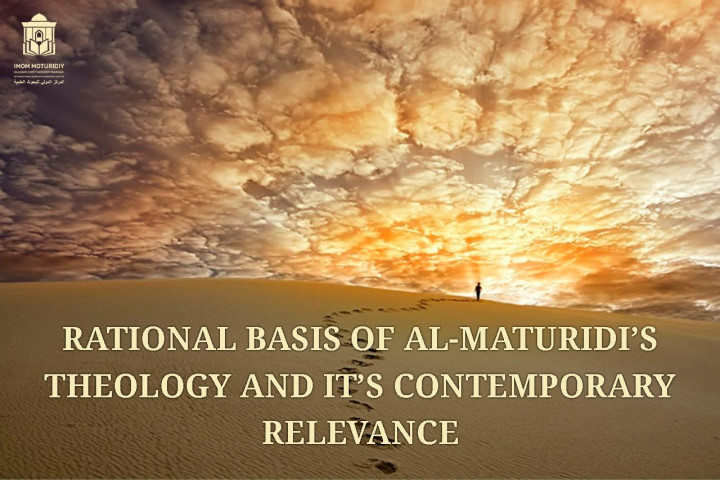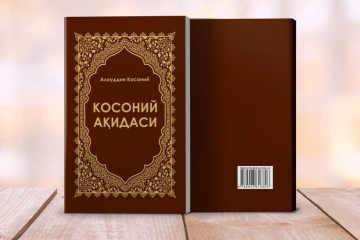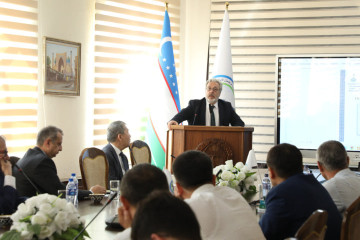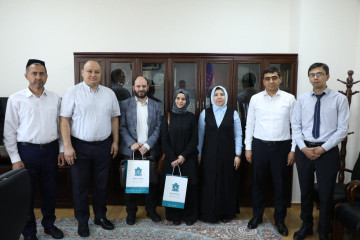
RATIONAL BASIS OF AL-MATURIDI’S THEOLOGY AND IT’S CONTEMPORARY RELEVANCE
Introduction
This paper briefly underlines the features of the rational basis of Abū Manṣūr al-Māturīdī’s theology with special emphasis on their relevance to the contemporary Muslims intellectual problems. As a theological framework that was regarded for thousands of years as the reference of Sunnite theology, al-Māturīdiyyah together with al-Ashāʿirah continue to play pertinent role in guiding the Muslims’ understanding concerning their belief system (ʿaqīdah). Both represents the middle path of the Sunni theology which is instrumental particularly in providing solutions of contemporary challenges to the Muslims. One of the fundamental issues that continuously being debated in the history of Islamic thought is the issue of the relation between reason and revelation. This is the realm where al-Māturīdī’s theology has a dominant contribution. As a matter of fact, compared to al-Ashʿarī, al-Māturīdī has contributed more in explaining the deeper understanding concerning the details of the reconciliation between reason and revelation which are reflected in his introduction of the theory of knowledge propounded in the preliminary chapters of his theological works. According to Mustafa Ceric, al-Māturīdī is the first known person who started the process of the Sunnite theological epistemology that eventually produced what Mustafa Ceric termed as “the Islamic Synthetic Theology” (Ceric,1995:82)
Rational Basis of Al-Maturidi’s Theology
- The Importance of Proof and Rejection of Imitation in Aqidah
In his theological writings, al-Māturīdī has strongly invalidated uncritical imitation (taqlīd) in ‘aqīdah and has placed intellectual proof (istidlāl) as a requirement of a true faith. In fact, alMāturīdī is more emphatic in underlining the importance of this condition compared to al-Ashʿarī. Qāḍī ʿAbd al-Jabbār, the Muʿtazilite renown theologian was also reported to be influenced by him in this issue (Kholeif, 1982:xvii). This idea of rejection of taqlīd in al-Māturīdī’s theology has later on influenced the theological discussion in Sunnite theology both in Ashʿarites and Māturīdites. In their theological works, it was affirmatively stated that one of the prerequisites of a true belief is to have valid proofs, either rational or textual. A person whose belief is not properly supported by a justified proof is regarded as disobedient Muslim and his faith is considered invalid. Other requirements of a valid faith are; that the belief must be in line with the reality (muwāfaqah li al-ḥaqīqah) and that the belief must be firm (jāzim). All these three conditions are very much indicative of the dominant role of reason in aqidah which requires consistency and clarity of mind in a belief system.
The strong rejection of taqlīd in matters of theology is also in line with the nature of theology in Islam which serves as the superstructure on which other matters in religion stand. This is the reason why theology is also called the Principles of the Religion (Uṣūl al-Dīn) which requires stronger basis of understanding compared to other aspects such as fiqh which is considered as the branches of religion (furūʿ al-dīn). It is therefore imperative that the knowledge of theology for the Muslims must be at the level of certainty (yaqīn) which is free from any form of doubt and conjecture.
- The Ability of Reason to Comprehend Revelation through Reasoning
Being the fundamental faculty that defines human being, al-Māturīdī affirms that human reason has the ability to understand whatever being revealed by God in the Qur’an. As a clear book (kitābun mubīn, al-Ma’idah, 5:15) which is devoid of crookedness (ghayr dhī ʿiwajin, al-Zumar 39:28), every message of the Qur’an is arguably clear to human reason. Nevertheless, the understanding has to come through the process of reasoning (naẓar).
In this regard, al-Māturīdī alluded in his Kitāb al-Tawḥīd,
…there is nothing that God would command to man unless He caused his reason to understand it, and likewise, there is nothing that God would speak to man unless He also caused the way through which he can understand that.” Therefore if man is short to understand of the bearing of the command, he is excused from it. However the principle ways to that (understanding) are different; the kinds of these ways are known through speculative thinking (naẓar) and intellectual exercise (fikr) (Ceric,1995:70)
Therefore, reasoning (naẓar) is necessary for a Muslim in order for him to arrive at a proper faith. Al-Māturīdī further argues,
God has given man a sign by way of which he can know the command, and He has stirred his mind to thought and reminded him of the various kinds of consequences (of his action). So if he commits sins, that will be only because of his abandoning the pursuit of naẓar and that is his own act (fiʿl), i.e., fault. Therefore, he will be argued against on the Day of Judgment by the very thing, he could be excused from. This is a result of his own act, (fault). (Ceric,1995:70)
In line with this, al-Māturīdī is of the view that the ambiguous verses (mutashābihāt) need to be allegorically interpreted based on the clear verses (muḥkamāt) through the strength of human reason. As a revealed book, al-Quran is a reservoir of wisdom that continues to provide goodness to human beings. It is, therefore, necessary for human being to use their reason through naẓar and fikr to understand the revelation.
- Reason as a Pertinent Channel of Knowledge in Knowing Theological Matters
In his epistemological elaboration, al-Māturīdī advanced three channels of knowledge (asbāb al-ʿilm); senses (hawās), reason (ʿaql) and true report or testimony (khabar/shahādat al-ghayr). All these three channels are important, since from each channel we acquire different kinds of knowledge that cannot be acquired by other means. (Kholeif,1982:xvii)
The third channel, which is reason, is an important channel of knowledge because we rely on it to judge sensory knowledge in matters which are too distant from the senses or too subtle. With respect to the testimony that comes to us, reason will help in deciding whether the report is a kind which might or might not be mistaken, and in distinguishing between the signs of the Prophets and the lies of the magicians and others. By reason also we know the divine wisdom in creation and the evidence therein of the existence of the creator. (Kholeif,1982:xx)
The introduction of this theory of knowledge by al-Māturīdī is very significant since no theologians before him has advance this kind of theory and almost all the Sunnite theologians after him had introduced similar theory of knowledge in the preliminaries of their theological works. The discussion of the theory of knowledge can be seen for example both in the theological works of later Ashʿarites and Māturīdites such as al-Baqillānī, al- Juwaynī, al-Ghazālī, al-Rāzī, al-Nasafī, al-Taftāzānī.
In theological matters al-Māturīdī views that some of the rulings that relate to legal accountability (taklīf) are known by intellect. It is because the intellect is a tool by which the goodness and evil of some things can be comprehended and by which the obligation of faith is comprehended (Kamal Pasha, 2018:16). In fact, it is also obligatory for man to arrive at the knowledge of God through reason even though there is no Prophet sent to them. Al-Māturīdī affirms, “Because of what one sees in the creation of the heavens and the earth, no one is excused by ignorance of his Creator,” and “Had Allah not sent a Messenger, it would have still be obligatory for creation to know Him through their intellects.” (Kamal Pasha, 2018:56)
The relevance of al-Māturīdī theological framework to the comtemporary solution
Al-Māturīdī’s framework in theology which emphasizes the dominant role of reason continues to leave significant impact on the present day’s understanding of ʿaqīdah among Muslims. Through the emphasis on the important preliminaries of knowledge and reason, al-Māturīdī’s theology has offered the following significance to the present Muslims’ challenges:
- The importance of proper reasoning in the justification of matters pertaining to ʿaqīdah.
Since ʿaqīdah is the framework and principle that guides the Muslims in their understanding of divine matters, it should not be conceived as something that is based on pure belief. It must be believed and understood through proper justification and proof (istidlāl). Reason, in this sense, should not be taken as contradictory and antagonistic to belief. This framework of thinking will lead to intellectual dynamism in the field of theology and will facilitate the process the mutual integration between reason and revelation as well as harmonization between farḍ ʿayn knowledge and farḍ kifāyah.
2. The rejection of uncritical imitation (taqlīd) in matters of ʿaqīdah. The current rapid growth of traditional studies through the emergence of the Islamic educational institutions such as Islamic college, madrasahs and traditional schools is a positive sign of the revival of religious sciences, there is nevertheless inclination among Muslims students who are involved in these learning processes to strongly cling to certain views without critically trying to analyze the views through systematic reasoning (naẓar) and thinking (fikr). Al-Māturīdī’s emphasis on proof and the rejection of taqlīd can serve as a strong foundation towards a more balance and middle path Sunnite theology.
3. The rejection of extreme, literal understanding of revelation. With a more rational approach towards understanding the Divine Book offered by al-Māturīdī’s theology, it will reduce and ultimately eliminate all forms of extremism that have re-emerged in the present globalized age. This is indicative of the importance of a more harmonious and balanced interpretation of the sources of religion in the education in presenting Islam as a universal message to humankind.
4. Re-establishment of balanced theological proofs against the liberal philosophical ideas that are influencing the Muslims. Just as how al-Māturīdī was facing in his time extreme philosophical and theological ideas coming from the philosophers and the Muʿtazilites and on the hand literal groups such as the extreme Hanābilah and Khawārij, Muslims today are also facing the extreme ideas coming from the liberal and secular philosophies as well as literal groups who advance the same epistemological challenges against the principles of Islam. Hence, they are in dire need of a more balanced way of employing both the textual and rational proof in presenting their theological position.
Dr. Mohd Farid Mohd Shahran,
Insitute Of Islamic Under Standing (Ikim). Kuala Lumpur, Malaysia
Bibliography
1. Ceric, Mustafa. Roots of Synthetic Theology: A Study of the Theology of Abu Mansur alMāturīdī. Kuala Lumpur: ISTAC,1995.
2. Al-Māturīdī, Abū Manṣūr. Kitāb al-Tawḥīd. Translated and introduced by Fathallah Kholeif. Beyrut: Dar al-Mashriq, 1982.
3. Pasha, Shams al-Dīn Aḥmad bin Sulaymān Kamal. The Differences Between the Ash’aris & Maturidis. Commentary by Said Fudah and translated by Abdul Aziz Suraqah. Rotterdam: Sunni Publication, 2018.
4. Al-Shāfiʿī, Ḥassan Maḥmūd, al-Madkhal ilā Dirāsat ʿIlm al-Kalām. Al-Qāhirah: Maktabah Wahbah, 1991.
Additional Information



 O`Z
O`Z
 РУ
РУ
 EN
EN
 العربية
العربية

Notes